Megan Whalen Turner was awarded the 2011 Los Angeles Times Book Prize for Young Adult literature for her latest novel, A Conspiracy of Kings.
Megan Whalen Turner: I’m Megan Whalen Turner, and I’m the author of a series of books that starts with The Thief and goes on with The Queen of Attolia, the The King of Attolia, and A Conspiracy of Kings, which last night was awarded the LA Times Book Prize for young adult literature. And you were asking me why everyone should read my book – I don’t know that I can say that everyone should read my books. I’ve always intended to write for a very specific audience – and with each book that audience grows, and people tell their friends, and their friends tell their friends, and so more and more people are reading my books, but I think still that I’m very lucky to write a kind of book that if people like it, they tend to like it a lot. It makes me happy that there are a number of people for whom my books are exactly what they like best. And it’s very flattering when they ask me to sign a book or something and they mention that I’m one of their favorite authors, and they list the others, and it’s immensely flattering to have the other people they list also be my favorites.
Byrt: Such as?
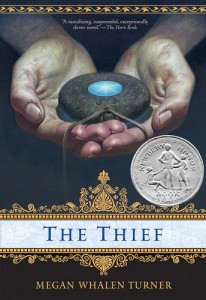 Megan Whalen Turner: Rosemary Sutcliff, Diana Wynne Jones, Joan Aiken, Gordon R. Dickson, and the usual – C.S. Lewis and Philip Pullman, and things like that. Peter Dickinson, Jane Louise Curry – a lot of the fantasists who were writing in the 1970’s are the people that I really love best.
Megan Whalen Turner: Rosemary Sutcliff, Diana Wynne Jones, Joan Aiken, Gordon R. Dickson, and the usual – C.S. Lewis and Philip Pullman, and things like that. Peter Dickinson, Jane Louise Curry – a lot of the fantasists who were writing in the 1970’s are the people that I really love best.
Byrt: I know you were talking in the panel about how Greece was a big inspiration for your fantasy world and your series – was that landscape only, or was there some mythological inspirations? Was it the Classical Greece –
Megan Whalen Turner: The landscape, the art work, the multiple gods and goddesses – I’m very interested in that period of time where you see people moving from really intense and automatic belief in their religion to a more open minded, scientific inquiry – you know, there are probably gods but I would not expect to meet one on Tuesday. That moment in time interests me, and it’s that moment in time that I set my books.
Byrt: You also mentioned the Byzantine Empire – was that another influence, in terms of technology meets the ancient world-
Megan Whalen Turner: It’s a tricky thing – if you read about Greece, you are almost always reading about ancient Greece. It’s almost as if the Roman empire fell, and the peninsula disappeared for the next two thousand years. And so when I wanted to see what that landscape would have been like in a time, sort of pre-industrial revolution – pre-enlightenment, really. Just as the enlightenment was happening in Europe, how that would have looked in a pantheistic world. I really looked more to Byzantine rather than the European model – I really wanted to write a fantasy that was not European.
Byrt: Was it hard to write a pantheon gods, a religion, that didn’t lean too heavily on classical paradigms – do you find yourself, is there a god of war-
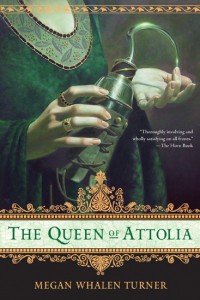 Megan Whalen Turner: If you look carefully at the gods – when we all went to 6th grade, and we all studied the Greek gods and goddesses, we were all given a one sentence description of who Zeus is, he’s the head of all the gods, who’s Hera, she’s his jealous wife, who’s Athena, she’s his virgin daughter. In fact, the Greeks gods and goddesses, they were never that simple. There wasn’t so much a sense that this person was the god of war and nothing else. But when I was writing my book, and I knew that I wanted to set it in this landscape, I also knew that I probably couldn’t use the Greek gods and goddesses, exactly because all of the nuance of their personalities has been stripped away, by this point. They’ve been boiled down to exactly that one sentence, and if you try to construct a story using them, you either have a really flat story with nothing happening, or as you give them three dimensions, you break the very rigid definition of who those gods and goddesses were, and you have everybody saying – Hera, nice? We all know Hera’s never nice! This story just is not canon…
Megan Whalen Turner: If you look carefully at the gods – when we all went to 6th grade, and we all studied the Greek gods and goddesses, we were all given a one sentence description of who Zeus is, he’s the head of all the gods, who’s Hera, she’s his jealous wife, who’s Athena, she’s his virgin daughter. In fact, the Greeks gods and goddesses, they were never that simple. There wasn’t so much a sense that this person was the god of war and nothing else. But when I was writing my book, and I knew that I wanted to set it in this landscape, I also knew that I probably couldn’t use the Greek gods and goddesses, exactly because all of the nuance of their personalities has been stripped away, by this point. They’ve been boiled down to exactly that one sentence, and if you try to construct a story using them, you either have a really flat story with nothing happening, or as you give them three dimensions, you break the very rigid definition of who those gods and goddesses were, and you have everybody saying – Hera, nice? We all know Hera’s never nice! This story just is not canon…
Byrt: Random question – have you ever read the Percy Jackson series?
Megan Whalen Turner: Oh yes, of course I’ve read them!
Byrt: What did you think of that interpretation of the Greek pantheon?
Megan Whalen Turner: I think they’re wonderful. Because they do bring back the idea that these were three dimensional, complex personalities. I mean, in Percy Jackson, his father is Poseidon, and you get a sense of the fact that even as a god, he is not all powerful. He would like to have raised his child, he would like to be with the mother of his child, but because of circumstances, he doesn’t really get what he wants, even though he’s the god Poseidon.
Byrt: Though he certainly has plenty of illegitimate children to-
Megan Whalen Turner: To feel guilty about. Exactly.
Byrt: I know you don’t like to talk about your books coming up, but do you have kind of a general- Are you a plotter or pants-er, when it comes to your series? Do you know-
Megan Whalen Turner: I’m a sketcher. I pretty much know where the whole series is going, and I have known it – when I wrote The Thief, I deliberately pruned my world to fit into the one book, and I had originally intended to only write the one book. But then it won the Newbery honor book prize in 1997, and when my editor called to congratulate me, she handed the phone to a friend who said she wanted a sequel. And that’s when I realized that all those things that I had pruned out of The Thief, because they weren’t relevant to the story that I was telling, I could tell in a much longer story. And so pretty much from that time on I conceived the story for The Queen of Attolia, but also all of the books… Actually that’s not entirely true. I knew what happened to Sophos, who’s the main character of A Conspiracy of Kings, but I had originally assumed that the events in his arc would happen off-stage. And I realized that that wouldn’t do, and that we needed to see the things happening to him in order to believe the change in his character, and so I wrote A Conspiracy of Kings.
Byrt: Have there been any surprises for you, over the course of writing your books? Have the characters done something you didn’t expect?
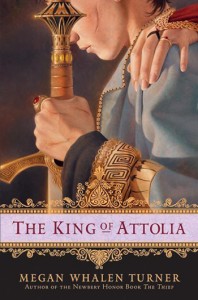 Megan Whalen Turner: No, not so much. I’m one of those people who pretty much believes that the characters do what I tell them to. I learn more about who they are and how they might behave, sometimes, as I’m spooling things out, but no, I don’t usually find them running in directions I don’t like.
Megan Whalen Turner: No, not so much. I’m one of those people who pretty much believes that the characters do what I tell them to. I learn more about who they are and how they might behave, sometimes, as I’m spooling things out, but no, I don’t usually find them running in directions I don’t like.
Byrt: Now in terms of being a YA author, do you find that people still kind of look down on YA authors? Is there still kind of a prejudice against the genre, generally? Or do you think, as it’s gotten more popular-
Megan Whalen Turner: There may well be, but I don’t hang out with those people. I do know that there’s always a sense that anybody can write a children’ s book, and if YA authors are struggling with this condescension from another genre, boy, it’s nothing that people who write books for children have not been dealing with for centuries.
Byrt: Do you think you’ll always be writing YA? Or do you have any interest in writing an adult novel someday?
Megan Whalen Turner: No. I think that when I was about eleven – I read Susan Cooper’s book, The Dark is Rising, and I realized at about the time I was reading those books that the most significant difference between children’s books, or movies or television, and books produced for adults is that in the books for adults the children don’t do anything. They get rescued. But they are not relevant to the plot really at all. And in children’s books, the children save the world and solve the crime and do everything, and that that was not realistic – in fact, that’s not the way it works – and that I didn’t care. I think that’s probably the moment at which I became somebody who was going to write books for children and for young adults
Byrt: What were you major influences, in terms of reading when you were growing up – what were the YA books that rocked your world and changed your life?
Megan Whalen Turner: Well, when I was growing up there weren’t really YA books, there were books for children. But the books that were for children when I was growing up in many cases were every bit as nuanced and complex as books for adults. We didn’t have some idea that this person couldn’t read that kind of book – I think that you read all of The Black Stallion books and then you could move on to adult science fiction and fantasy if you wanted. And many people did-
Byrt: That’s exactly what I did.
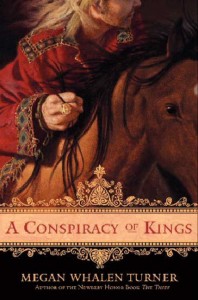 Megan Whalen Turner: Many of us did – we read our children’s books. But when you look back at the historical fiction that I love to read, like that by Rosemary Sutcliff, a lot of her books were really what we today would call adult books – but back then those were considered children’s books. And I think that there wasn’t a word for the young adult book, but there were certainly authors who were writing for people who were mature readers at age twelve. And I think Rosemary Sutcliff was one of those, and she was one of the biggest influences on me, and so was Joan Aiken, and Diana Wynne Jones.
Megan Whalen Turner: Many of us did – we read our children’s books. But when you look back at the historical fiction that I love to read, like that by Rosemary Sutcliff, a lot of her books were really what we today would call adult books – but back then those were considered children’s books. And I think that there wasn’t a word for the young adult book, but there were certainly authors who were writing for people who were mature readers at age twelve. And I think Rosemary Sutcliff was one of those, and she was one of the biggest influences on me, and so was Joan Aiken, and Diana Wynne Jones.
Byrt: Who we all miss very much.
Megan Whalen Turner: But so was Robert Heinlein – I’m a big fan of spaceships and laser beams.
Byrt: What were your favorite science fiction books growing up?
Megan Whalen Turner: Probably Gordon R. Dixon, the Dorsaii books – do you know those?
Byrt: No, I don’t…
Megan Whalen Turner: And Heinlein’s juveniles – I still have a soft spot for those. My kids are reading them now.
Byrt: Brainwashing from a young age – I like it! Well Megan, congratulations again on the win – do you have a place picked out at home to put your-
Megan Whalen Turner: My little folder? I don’t know. I do know that in the fall, A Conspiracy of Kings was an honoree – an honor book award for the Boston Globe Horn Book Prize for YA fiction – and they gave me a little platter. And we’ve been happily using the little platter for everything, so I have a feeling that we’re going to be putting the certificate for the LA Times Book Prize in the middle of the dinning room table for at least the next six months.
Byrt: As it should be. Alright, well thank you again for taking the time Megan!
Megan Whalen Turner: Thank you very much.
For more on Megan and her books, check out her website, here.
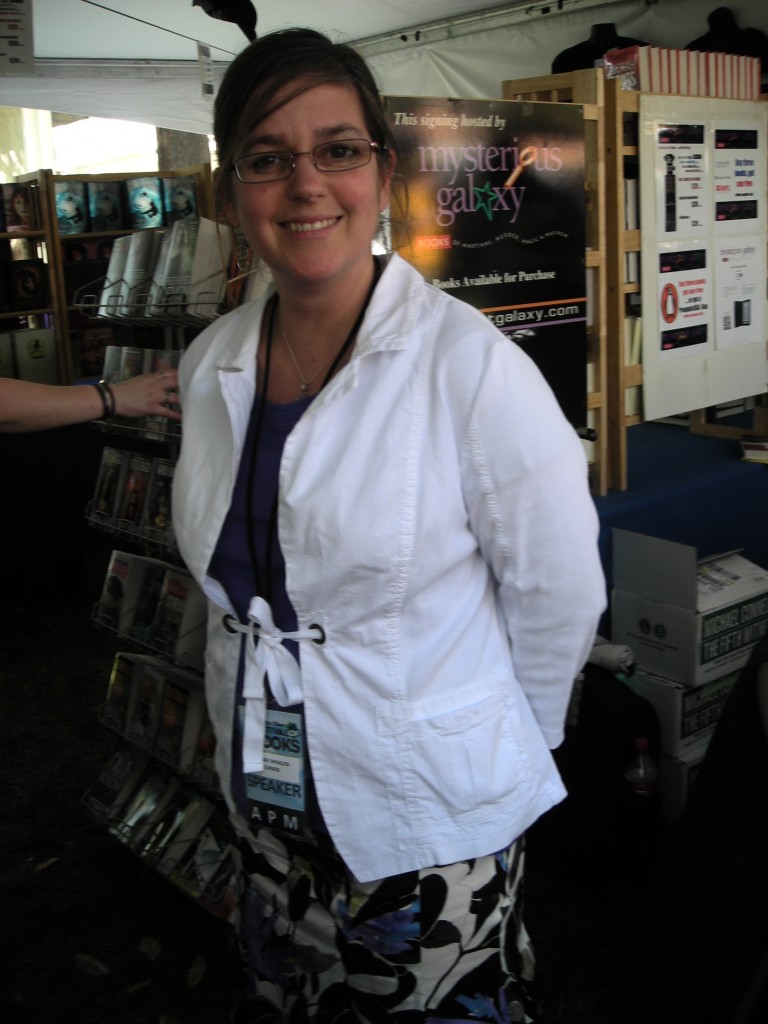






Thanks Byrt! That was great!
And thanks Megan too of course (goes to library website to see if they have any Gordon R. Dixon books….)
Thank you, Megan and Byrt for this interview! Like Charlotte, I’m going to look for the books that MWT mentioned in this interview.
Thanks for reading! And me too – I’m def going to check out the Dorsaii books… :)
Great interview! I agree with what Megan says about the different books for different types of people. I have a friend who reads books that I wouldn’t read in a million years, and she probably thinks the same about my taste in novels. That doesn’t stop us from trying to recommend books to each other, but isn’t that what true friends do?